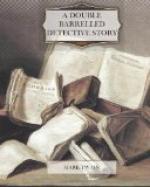“Boys, I ain’t sorry, now, that he wasn’t here to roust out the child; this is a bigger thing, by a long sight. Yes, sir, and more tangled up and scientific and intellectual.”
“I reckon we’re all of us glad it’s turned out this way. Glad? ’George! it ain’t any name for it. Dontchuknow, Archy could ’ve learnt something if he’d had the nous to stand by and take notice of how that man works the system. But no; he went poking up into the chaparral and just missed the whole thing.”
“It’s true as gospel; I seen it myself. Well, Archy’s young. He’ll know better one of these days.”
“Say, boys, who do you reckon done it?”
That was a difficult question, and brought out a world of unsatisfying conjecture. Various men were mentioned as possibilities, but one by one they were discarded as not being eligible. No one but young Hillyer had been intimate with Flint Buckner; no one had really had a quarrel with him; he had affronted every man who had tried to make up to him, although not quite offensively enough to require bloodshed. There was one name that was upon every tongue from the start, but it was the last to get utterance—Fetlock Jones’s. It was Pat Riley that mentioned it.
“Oh, well,” the boys said, “of course we’ve all thought of him, because he had a million rights to kill Flint Buckner, and it was just his plain duty to do it. But all the same there’s two things we can’t get around: for one thing, he hasn’t got the sand; and for another, he wasn’t anywhere near the place when it happened.”
“I know it,” said Pat. “He was there in the billiard-room with us when it happened.”
“Yes, and was there all the time for an hour before it happened.”
“It’s so. And lucky for him, too. He’d have been suspected in a minute if it hadn’t been for that.”
III
The tavern dining-room had been cleared of all its furniture save one six-foot pine table and a chair. This table was against one end of the room; the chair was on it; Sherlock Holmes, stately, imposing, impressive, sat in the chair. The public stood. The room was full. The tobacco-smoke was dense, the stillness profound.
The Extraordinary Man raised his hand to command additional silence; held it in the air a few moments; then, in brief, crisp terms he put forward question after question, and noted the answers with “Um-ums,” nods of the head, and so on. By this process he learned all about Flint Buckner, his character, conduct, and habits, that the people were able to tell him. It thus transpired that the Extraordinary Man’s nephew was the only person in the camp who had a killing-grudge against Flint Buckner. Mr. Holmes smiled compassionately upon the witness, and asked, languidly:
“Do any of you gentlemen chance to know where the lad Fetlock Jones was at the time of the explosion?”




